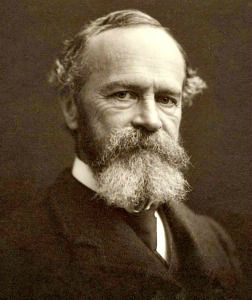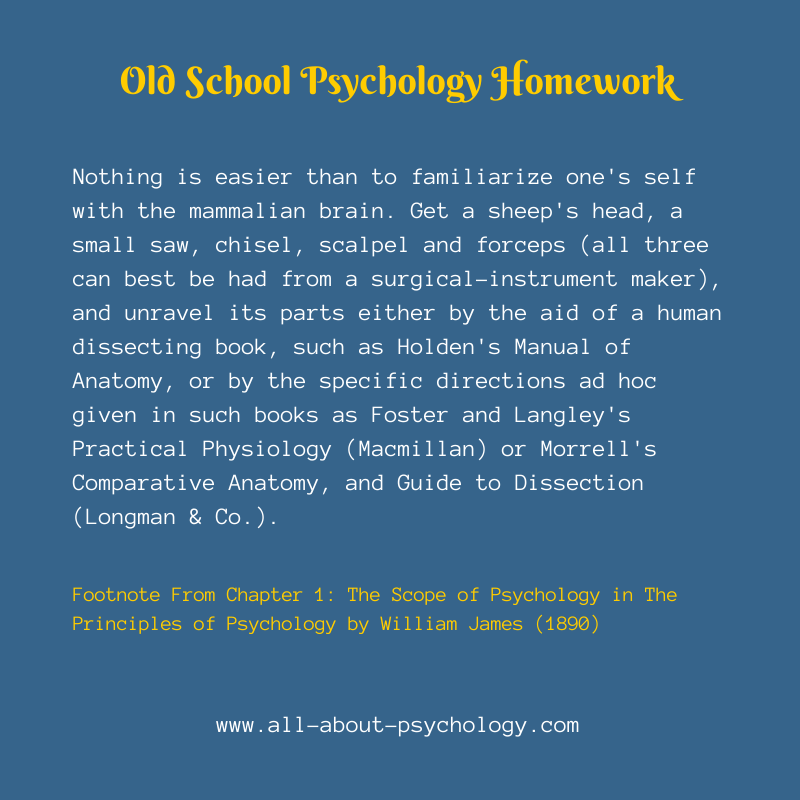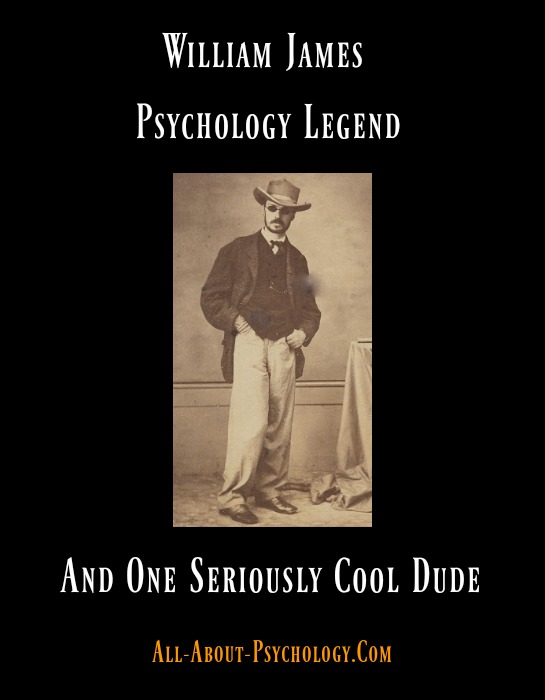Psychology Classics On Amazon

William James
(Jan 11, 1842 - Aug 26, 1910)
William James was one of the most eminent figures in the history of psychology, James is best known for his hugely influential work 'The Principles of Psychology,' first published in 1890 and widely regarded as the most important English language psychology book ever.
A revered thinker and prolific writer, James explored an extraordinary range of topics such as the perception of time, emotions, imagination and whether life is worth living. He never missed an opportunity to study and report on something of human and psychological interest; When "The Great" San Francisco earthquake hit on the morning of April 18th, 1906, James was just 35 miles away. Close enough to have experienced the earthquake directly he was keen to discover how his subjective experience of the event compared with those around him and so made his way to San Francisco itself, which in his own words gave him and his "valiant feminine escort some four hours of observation."
During his 34-year career at Harvard University, James offered the first graduate course in psychology taught in The United Sates in 1875-6 and twice served as president of the American Psychological Association in 1894 and 1904.
Maxims To Live Your Life By
Classic William James Quotes
In Memoriam
The following tribute to William James was published shortly after his death on the 26th August 1910. Written by James McKeen Cattell, it appeared in the October 1910 edition of Popular Science Monthly.
(Many thanks to Dr. Andreas Sommer, University of Cambridge for identifying Cattell as the author.)
Is there left to us in this land a man so great as William James? If the list of our leaders is scanned, men eminent in philosophy, science, art or letters, in education, law, politics or business, is there a single one to be placed beside him? He excelled in so many ways, in science, in philosophy in letters, as a teacher, as a leader in good causes and lost causes, before all as a man - kind and generous beyond measure, of remarkable individuality and distinction.
The "Principles of Psychology" published in 1890, is a scientific and literary classic. No one can foretell whether it will be permanently in the group of philosophical masterpieces, beginning with the dialogues of Plato, but there is no contemporary American work and possibly no European work since the "Origin of Species," which has equal chance.
Wilhelm Wundt and William James are the founders of psychology, a science which in a single generation has assumed a place coordinate with the other leading sciences. Both men - like their forerunners, Lotze and Von Helmholtz - had an education in medicine and the natural sciences, with strong natural interests in philosophy and metaphysics. They established laboratories of psychology at about the same time, neither of them did experimental work of consequence, both prepared treatises which to a remarkable extent established the lines of development for a science. Wundt's "Physiologische Psychologie"; is more systematic than James's "Principles of Psychology "; it is more of an encyclopedia. For that reason it could be brought out in various editions, corrected and enlarged. James's "Psychology" is more of a work of art, exhibiting the subject as he left it twenty years ago.
It is truly a remarkable book, combining physiology, pathological psychology, comparative psychology, experimental psychology, introspective psychology and philosophy into one whole which has dominated the science. The author is always accurate in his scientific material and clear in his statements, but frank in his criticism and daring in his conclusions. His own contributions on the stream of thought, the perception of things and of space, the emotions, instinct, habit and in many other directions are of fundamental importance. The work has an extraordinary vitality and individuality which make it a work of art and a classic.
In his "talks to teachers" and "Varieties of Religious Experience," James extended the field of psychology in two important directions. Nearly all his work was done in a somewhat opportunistic fashion. He made an engagement to give lectures, perhaps cancelled it or tried to do so, felt he could not prepare them and finally produced a masterpiece. "The Will to Believe" was a collection of addresses; the volume on "Religious Experience" was Gifford lectures, the "Pragmatism" Lowell lectures, "A Pluralistic Universe" Hibbert lectures.
Although the interest in problems of philosophy and the pluralism, pragmatism and empiricism may be traced backward to his earlier publications, they were given full and vigorous expression only in these later volumes, when James had passed the age of sixty and was already suffering from disease of the heart. It would be idle to attempt to give here an exposition of James's attitude in philosophy. Pragmatism - the term was first used by James's friend, Charles S. Peirce, in this journal - is called on the title page of his book "a new name for an old way of thinking." It is largely the method of science applied to philosophy, but it is after all what James thought and said and wrote. His personality and its expression, the intellect swayed by the will and the emotions, have made a deep impression not only on professional philosophy but in the world of men.
James inherited his brilliant literary skill from his father and shared it with his brother. His education was long and irregular. He did not graduate from Harvard, but studied art and was with Agassiz in Brazil. From 1872 to 1880 he was instructor and assistant professor of comparative anatomy and physiology at Harvard then professor of philosophy, then of psychology and then again of Philosophy.
It is not probable that James left unpublished manuscripts, but his letters would form a volume of surpassing interest, though it may be that they are too personal for publication. The writer ventures to reproduce the concluding parts of the last two which he received, the one from Cambridge and the other from Bad Nauheim, where he had gone for treatment of the disease that so soon proved fatal.
James at first declined on account of his health to accept the active presidency of the International Congress of Psychology to be held in this country. There was no one else to take the place, so when difficulties arose he played his part with characteristic loyalty and self-sacrifice.
This Psychology Symbol - Vintage Retro Striped Sunset T-Shirt is available from Amazon (prime eligible) in a range of colors for women and men. Sales help support this website, which has been providing free and comprehensive information and resources for psychology students and educators since 2008.
Recent Articles
-
Serial Killer Traits
Apr 28, 24 06:24 AM
What are the common traits or characteristics observed in serial killers? -
Being A People Pleaser
Apr 27, 24 11:05 AM
Is my tendency to constantly seek approval and accommodate others a sign of being a people pleaser, and if so, how can I better understand and address -
Psychological Theories
Apr 25, 24 09:43 AM
I’ve set a lofty or an over ambitious goal of reading and gathering psychological theories or principles starting from prehistorical religion up until
Please help support this website by visiting the All About Psychology Amazon Store to check out an awesome collection of psychology books, gifts and T-shirts.
Go From William James Back To The Psychology Pioneers Page











New! Comments
Have your say about what you just read! Leave me a comment in the box below.